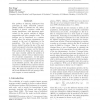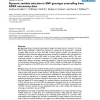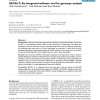172
click to vote
BMCBI
2008
15 years 19 days ago
2008
Background: Genome-wide association studies (GWAS) aim to identify genetic variants (usually single nucleotide polymorphisms [SNPs]) across the entire human genome that are associ...
142
click to vote
JCB
2007
15 years 1 months ago
2007
The problem of inferring haplotypes from genotypes of single nucleotide polymorphisms (SNPs) is essential for the understanding of genetic variation within and among populations, ...
133
click to vote
TCBB
2008
15 years 1 months ago
2008
A Single Nucleotide Polymorphism (SNP) is a position in the genome at which two or more of the possible four nucleotides occur in a large percentage of the population. SNPs accoun...
130
click to vote
EC
2007
15 years 2 months ago
2007
Evolutionary algorithms rarely deal with ontogenetic, non-inherited alteration of genetic information because they are based on a direct genotype-phenotype mapping. In contrast, i...
109
click to vote
BMCBI
2006
15 years 2 months ago
2006
Background: Single nucleotide polymorphisms (SNPs) are DNA sequence variations, occurring when a single nucleotide
126
click to vote
BMCBI
2008
15 years 2 months ago
2008
Background: The power of haplotype-based methods for association studies, identification of regions under selection, and ancestral inference, is well-established for diploid organ...
135
click to vote
BMCBI
2010
15 years 2 months ago
2010
Background: Accurate classification into genotypes is critical in understanding evolution of divergent viruses. Here we report a new approach, MuLDAS, which classifies a query seq...
107
click to vote
BMCBI
2007
15 years 2 months ago
2007
Background: Genotype information generated by individual and international efforts carries the promise of revolutionizing disease studies and the association of phenotypes with al...
138
click to vote
GECCO
2010
Springer
15 years 6 months ago
2010
Springer
This paper presents a new form of Genetic Programming called Cartesian Genetic Programming in which a program is represented as an indexed graph. The graph is encoded in the form o...
117
click to vote
CPM
2004
Springer
15 years 7 months ago
2004
Springer
The perfect phylogeny model for haplotype evolution has been successfully applied to haplotype resolution from genotype data. In this study we explore the application of the perfe...




